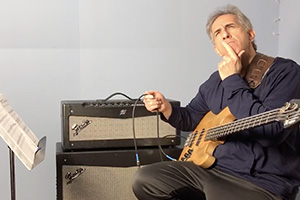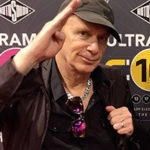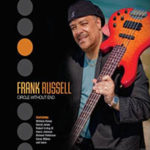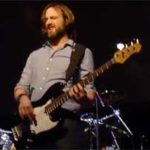Two camps, two schools of thought
By Jon Liebman
Week of February 3, 2020
It was fun running into fellow Detroiter Al Turner at the NAMM show last month. As soon as I saw him, I asked if he would do a follow-up interview with me. He immediately agreed, and we published his hot-off-the-presses interview this week.
After listening to Al tell me about what he’s been up to with his recordings, working with Earl Klugh and Kem, future projects, etc., we got to talking about bass gear. When the subject of amps came up, Al told me about his rig, and also about how much he likes using in-ear monitors in addition to his onstage amp.
That kind of setup isn’t really new. The trend I’ve been spotting more and more, though, is people using in-ears instead of an amp, even in arena-sized venues.
Then my mind went to the opposite end of the spectrum: What about practicing? When you practice at home, do you amplify your sound in any way, or is it just you and the bass?
There are definitely two schools of thought on this subject.
We hear many bass players incessantly reciting their mantra, “Sound comes from the hands.” Others, however, argue that their true sound just can’t be heard without an amp. Sometimes, even, more than just an amp.
Personally, I seldom if ever use an amp to practice, as I don’t find it necessary. My guitar-playing son, on the other hand, always used to insist that he needed to practice with his amp, or else his sound just wasn’t authentic. (Subsequently, the “Dad” in me kept asking him to please turn it down!)
If your sound is defined by a bunch of processors, and you just can’t make anything happen without your pedalboard, rackmount modules, and whatever else you need, I get that.
But I’m talking about the music, not the effects. Can you just practice the music till you’ve got it down, then inject the processors and stuff after the fact?
“What about getting a good tone?” you ask. Yes, of course. That’s an absolute must. But again, that’s after the fact, and it’s not what I’m talking about.
Here’s my real question:
How important is it to play through an amp (and stuff) when you’re practicing your scales and modes, grooving, soloing, improvising, string crossings, sight reading or anything else that’s music-related?
Maybe I’m missing something, but I say, “Not at all.”
How about you? Have a thought on the subject? Leave a comment below and let me know what you think. In the meantime, check out my interview with Al here.






I never practice with an amp.
Both. In general, I’ll practice without an amp for musical stuff, but I also practice with headphones in my home studio. Amplified, but without an amp. The biggest issue for with practicing without an amp is that I tend to play harder unplugged just to hear it. That puts undue strain on my hands and wrists and is counter to my desire to play with a lighter touch in general (a lighter touch helps with sustain and greater dynamics).
But, I see no reason to be militant about one way or the other. Everyone needs to do what is most convenient and often times, it’s convenient to just pick up the bass and do some work without having to fire up an amp.
Hi Jon
I practice mostly without an amp. However an amp is useful just to check if I have the muting down and any sympathetic noise under control. Just a thought.
It depends on how acoustically loud your bass is and how quiet your practice space is. If you do use an amp, turn it way down, make yourself work harder to produce the sound. Then when you’re playing at your regular volume, you’ll sound better with less effort.
It’s good to practice through headphones with an amp that can provide a lot of detail. That helps you clean up your playing.
Instead of practicing one way all the time, I mix it up and use a variety of approaches. It’s also good to practice both sitting down and standing. Some basses are great on a strap and terrible to play sitting down, and vice versa. Varying the practice routine will help determine which bass to bring to a session or gig.
If you want to practice your muting and other techniques I think it’s good to practice with an amp or headphone amp. And when you’re testing out pedals/or effects just to get your sound or dynamics in control; again good to use a amp or headphone amp. Me personally if I’m practicing scales or runs I leave my amp off. I guess it’s to each his/her own discretion. Me personally I use BOTH.
Part of my experience as a recording studio engineer kind of demands my need to “feel” the bass and how it fits in with the drummers kick drum. That’s part of the groove for me. In the early Chicago records, Danny Seraphine’s kick were generally sub-mixed to the same track as Peter Cetera’s bass.
High quality studio headphones are acceptable, but I often play a 5-string. I like to be able to hear the fullness of that low B string without distortion. Only certain types of gear and cabinets are adequate for 5 string reproduction and can’t be heard on a cheap set of headphones. Maybe there’s exceptions on pro-grade ear monitors. For general practice, I do well with a well designed 2 X 10 cabinet, and a decent head with a reserve of 200 or more watts. Of course, you never turn it up to that level, but the reserve wattage allows the deepest lows to be produced accurately (again without distortion or sounding “flubby”) — even at lower playing volume.
I think that practicing with an amp will remind us what areas we have to work on. If we cant hear our selves we can not know when we play or too hard or soft. String noise and other technical aspects can be perceived when we can hear ourselves. Timbre is such an important aspect for a bass player because we can with just a precision bass make it sound like various different tones depending on the genre and a clean amp is important in having our sound.
Both, but mainly I like to practice amplified for the sake of dialing in my tone and dynamics as I play.
Home practice and playing live will sound different but it’s a reference point for me.
Sometimes at home I just have to kick up the volume when playing along with recordings, jam tracks, drum beats or a metronome.
Without. But to be fair: I also play the gig without the amp (preamp pedal to mix + IEM), so I naturally try to stay as close to the gig set-up as possible. Although I have to admit to crank up my 500W MarkBass once in a while while at home. I’m only human…
Hi Jon, do you mean practice on the bass total unpluged?? I also spent a lot of time practice without turning the amp on, just unpluged. I think it helps to stay more focused on the instrument and on the technical side of practice, like coordination, finger technique also rhythmical exercises are good to practice like this. When it comes to the melodic part of practice, like scales, arpeggios etc. I prefere to turn on the amp because of envolving the ear training on which I have to work. Without the amp I can not hear the notes, intervals and the articulation. I am an intermediate student.
Hey Jon, definitely without. The only time I would practice with an amp, is to work on getting a certain tone. But, after all these years playing, I am pretty sure I have my old school tone down. Without an amp I am more aware of the tonal qualities of a bass. It also allows me to keep a close check on my technique and touch. I believe that if it doesn’t sound good unplugged, it won’t sound good plugged in.
This is one of those “Is your tool-kit a hammer or a pair of pliers” questions. The answer is all of the above, depending. My wife prefers NOT to hear scales, arpeggios, etc done to a metronome click, so headphones for that. However, headphone amps generally overload and produce distortion so – esp. with a low B, I use a small studio amp to work on tunes and tones that don’t reproduce well in the cans. Also, acoustically speaking, headphones compress bass frequencies which is why I don’t like in-ears on stage. But hey – that’s personal preference and as the Romans said, De gustibus, non disputandum est.
I play both electric and Double bass. I never use an amp while practicing electric and obviously not while practicing double bass-but here’s the thing, I recently read an interview with Rufus Reid where he mentioned using an amp while practicing arco technique on the double bass. He said if you can play cleanly through an amp while bowing, then you’re REALLY playing cleanly. I’ve been a professional orchestra bassist for most of my career and have always relied on just the sound coming out of my bass when I practiced (same goes for when I’m performing-with some exceptions) But after reading what Mr Reid mentioned, I tried it. It’s a real eye opener and after a few months of using an amp for certain bowing exercises, I can honestly say it’s improved my arco tone tremendously. I don’t use an amp for everything I practice, but just spending a little bit of practice time with it has improved my tone dramatically.
Very interesting, Tom. I never would have thought of that! Thanks.
I’m a novice player and I started off playing an acoustic/electric to have a Bass to practice and learn on.
The day I plugged into an AMP was truly a WTF moment!
Highend Headphones had to follow quickly.
You truly need to practice both ways, because it’s the same but at the same time it’s not, each way has something to offer.
Headphones! we have to be kind to others while practicing and when the moments right unplug those headphones and play like your a rockstar!
So glad you made this discovery, Brad. It’s only a matter of time till you’ll have to change your username to “Brad the Pro!” Thanks for weighing in.